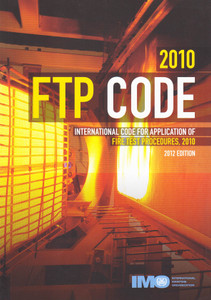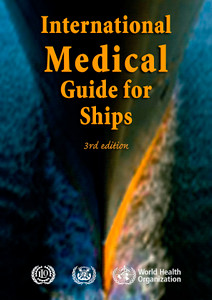
This publication outlines international standards of engineering specifications for fire safety systems, as required by chapter II -2 of the International Convention for the Safety of Life at Sea (SOLAS), 1974, as amended.
This publication details engineering specifications for fire safety equipment and systems, as required by SOLAS chapter II-2. Topics covered include:
- International shore connections
- personnel protection
- fire extinguishers
- fixed gas fire-extinguishing systems
- fixed foam fire-extinguishing systems
- fixed pressure water-spraying and water-mist fire-extinguishing systems
- fixed hydrocarbon gas detection systems.
- It also includes IMO resolutions and circulars relevant to the Code.
Foreword
The International Code for Fire Safety Systems (FSS Code) was adopted by the Maritime Safety Committee (MSC) at its seventy-third session in December 2000, by resolution MSC.98(73), in order to provide international standards for the fire safety systems and equipment required by chapter II -2 of the 1974 SOLAS Convention. The Code is made mandatory under SOLAS amendments to the Convention adopted by the MSC at the same session, by resolution MSC.99(73), and entered into force on 1 July 2002.
The FSS Code has been amended in accordance with SOLA S article VIII as follows:
.1 by the May 2006 amendments, which were adopted by resolution MSC.206(81) and entered into force on 1 July 2010;
.2 by the December 2006 amendments, which were adopted by resolution MSC.217(82) and entered into force on 1 July 2008 and 1 July 2010, as applicable;
.3 by the May 2010 amendments, which were adopted by resolution MSC.292(87) and entered into force on 1 January 2012;
.4 by the December 2010 amendments, which were adopted by resolution MSC.311(88) and entered into force on 1 July 2012;
.5 by the May 2012 amendments, which were adopted by resolution MSC.327(90) and entered into force on 1 January 2014;
.6 by the November 2012 amendments, which were adopted by resolution MSC.339(91) and entered into force on 1 July 2014; and
.7 by the May 2014 amendments, which were adopted by resolution MSC.367(93) and enter into force on 1 January 2016.
The consolidated text of the FSS Code in the present publication incorporates the above sets of amendments.
In order to make this publication as comprehensive as possible for use by equipment and systems manufacturers, shipowners and operators, shipyards, classification societies and Administrations, all related fire safety standards and guidelines adopted by either the Assembly or the MSC and referred to in the FSS Code have been incorporated, as appropriate, in this publication for the guidance and convenience of users.*
* Please always refer to the IMO website for updated circulars.
Foreword
Preamble
Chapter 1: General
Chapter 2: International shore connections
Chapter 3: Personnel protection
Chapter 4: Fire extinguishers
Chapter 5: Fixed gas fire-extinguishing system
Chapter 6: Fixed foam fire-extinguishing systems
Chapter 7: Fixed pressure water-spraying and water mist fire-extinguishing systems
Chapter 8: Automatic sprinkler, fire detection and fire alarm systems
Chapter 9: Fixed fire detection and fire alarm systems
Chapter 10 Sample extraction smoke detection systems
Chapter 11 Low-location lighting systems
Chapter 12 Fixed emergency fire pumps
Chapter 13 Arrangement of means of escape
Chapter 14 Fixed deck foam systems
Chapter 15 Inert gas systems
Chapter 16 Fixed hydrocarbon gas detection systems
Fire Safety Standards and guidelines:
Adoption of the International Code for Fire Safety Systems, Resolution MSC.98(73)
Guidelines for the evaluation, testing and application of low-location lighting on passenger ships, Resolution A.752(18)
Revised guidelines for approval of sprinkler systems equivalent to that referred to in SOLA S regulation II -2/12, Resolution A.800(19)
Improved guidelines for marine portable fire extinguishers, Resolution A.951(23)
Amendments to the Revised Guidelines for approval of sprinkler systems equivalent to that referred to in SOLA S regulation II -2/12 (resolution A.800(19)), Resolution MSC.265(84)
Amendments to the Revised Guidelines for approval of sprinkler systems equivalent to that referred to in SOLA S regulation II -2/12 (resolution A.800(19)), Resolution MSC.284(86)
Alternative arrangements for halon fire-extinguishing systems in machinery spaces and pump-rooms, Resolution MSC/Circ.668
Guidelines for the performance and testing criteria, and surveys of high-expansion foam concentrates for fixed fire-extinguishing systems MSC/Circ.670
Revised standards for the design, testing and locating of devices to prevent the passage of flame into cargo tanks in tankers
MSC/Circ.677
Revised test method for equivalent water-based fire-extinguishing systems for machinery spaces of category A and cargo pump-rooms contained in MSC/Circ.668
MSC/Circ.728
Revised factors to be taken into consideration when designing cargo tank venting and gas-freeing arrangements
MSC/Circ.731
Indication of the assembly station in passenger ships
MSC/Circ.777
Guidelines for performance and testing criteria and surveys of medium-expansion concentrates for fire-extinguishing systems
MSC/Circ.798
Revised Guidelines for the approval of equivalent fixed gas fire-extinguishing systems, as referred to in SOLA S 74, for machinery spaces and cargo pump-rooms
MSC/Circ.848
Amendments to the Revised standards for the design, testing and locating of devices to prevent the passage of flame into cargo tanks in tankers (MSC/Circ.677)
MSC/Circ.1009
Revised Guidelines for the approval of equivalent water-based fire-extinguishing systems for machinery spaces and cargo pump-rooms
MSC/Circ.1165
Interim Guidelines for the testing, approval and maintenance of evacuation guidance systems used as an alternative to low-location lighting systems
MSC/Circ.1168
Amendments to the Revised Guidelines for the approval of equivalent water-based fire-extinguishing systems for machinery spaces and cargo pump-rooms (MSC/Circ.1165)
MSC.1/Circ.1237
Guidelines for the approval of fixed fire detection and fire alarm systems for cabin balconies
MSC.1/Circ.1242
Amendments to Revised Guidelines for the approval of equivalent fixed gas fire-extinguishing systems, as referred to in SOLA S 74, for machinery spaces and cargo pump-rooms (MSC/Circ.848)
MSC.1/Circ.1267
Guidelines for the approval of fixed pressure water-spraying and water-based fire-extinguishing systems for cabin balconies
MSC.1/Circ.1268
Amendments to the Revised Guidelines for the approval of equivalent water-based fire-extinguishing systems for machinery spaces and cargo pump-rooms (MSC/Circ.1165)
MSC.1/Circ.1269
Revised Guidelines for the approval of fixed aerosol fire-extinguishing systems equivalent to fixed gas fire-extinguishing systems, as referred to in SOLA S 74, for machinery spaces
MSC.1/Circ.1270
Revised Guidelines for the performance and testing criteria, and surveys of foam concentrates for fixed fire-extinguishing systems
MSC.1/Circ.1312
Amendments to the Revised standards for the design, testing and location of devices to prevent the passage of flame into cargo tanks in tankers (MSC/Circ.677, as amended by MSC/Circ.1009)
MSC.1/Circ.1324
Guidelines for the design, construction and testing of fixed hydrocarbon gas detection systems
MSC.1/Circ.1370
Guidelines for the testing and approval of fixed high-expansion foam systems
MSC.1/Circ.1384
Amendments to the Revised Guidelines for the approval of equivalent water-based fire-extinguishing systems for machinery spaces and cargo pump-rooms (MSC/Circ.1165)
MSC.1/Circ.1386
Revised Guidelines for the design and approval of fixed water-based fire-fighting systems for ro-ro spaces and special category spaces
MSC.1/Circ.1430
IMO
As a specialised agency of the United Nations, IMO is the global standard-setting authority for the safety, security and environmental performance of international shipping. Its main role is to create a regulatory framework for the shipping industry that is fair and effective, universally adopted and universally implemented.
In other words, its role is to create a level playing-field so that ship operators cannot address their financial issues by simply cutting corners and compromising on safety, security and environmental performance. This approach also encourages innovation and efficiency.
Shipping is a truly international industry, and it can only operate effectively if the regulations and standards are themselves agreed, adopted and implemented on an international basis. And IMO is the forum at which this process takes place.
- Number of Pages:
- 352
- ISBN:
- 9789280116014
- Binding Format:
- Paperback
- Book Height:
- 0 mm
- Book Width:
- 0 mm
- Author:
IMO
- Published Date:
- January 2016
- Preview:
- Yes
- Publication Date:
- January 2016




